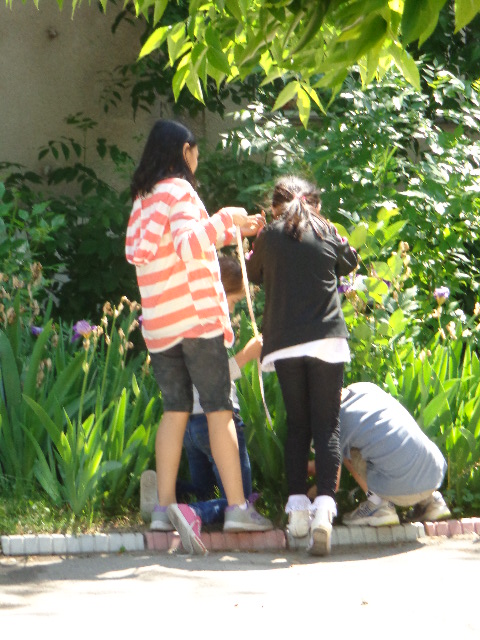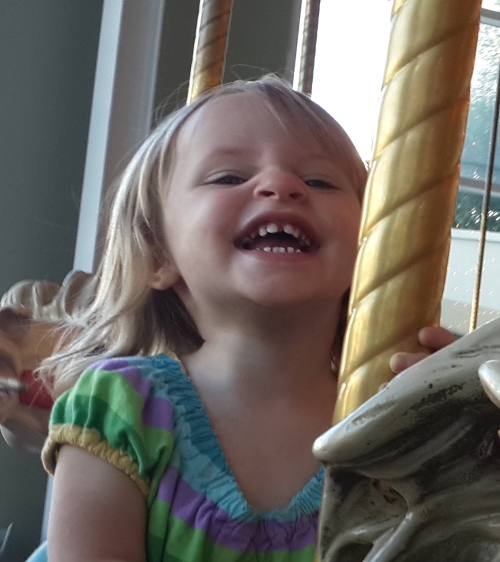Why Do We Teach?
Most of us would answer this question by saying that we want to make a difference, we want to help make the world a better place or at least play some role in making our students’ lives better, preparing them well for their futures.
The mission of TeachBeyond is that we provide educational services “as part of God’s ongoing mission to transform individuals and communities into all that God intends.”[1] Yes, we teach our students math and science and reading and art. But let’s remember that those are not the ends. It is through these various disciplines that our students develop their own unique sets of knowledge, skills, values and dispositions on the way to becoming all that God intends. We do not simply teach reading or science or art. We teach a much greater curriculum. We might even call it the Great Curriculum.
We teach this Great Curriculum by asking and responding to a few essential questions throughout each of the disciplines that we teach.
 We invite our students to become inquisitive, to explore and take apart and put back together and solve and resolve problems as they learn about this amazing, created world through the disciplines of science – all the while teaching the humility that our hypotheses are not always true and that we must trust our Creator to show us the truth of His creation in His due time. We remind our students that God intends for us to be stewards of this created world, challenging them to consider what this means in their own lives.
We invite our students to become inquisitive, to explore and take apart and put back together and solve and resolve problems as they learn about this amazing, created world through the disciplines of science – all the while teaching the humility that our hypotheses are not always true and that we must trust our Creator to show us the truth of His creation in His due time. We remind our students that God intends for us to be stewards of this created world, challenging them to consider what this means in their own lives.
We visit the stories of the world with our students – stories from past to present, from this place to that place. We ask them who is God in the story and who are they in it. We celebrate the good stories and learn from the bad and the hard stories. Through them, we learn together that God has been, and will continue to be, at work in all the stories of this world, with different people and in different places.
We discover that God wants to be in good relationship with us. He has been reaching out and communicating since before time, for in the beginning was the Word. He has chosen to communicate with us through His Spirit and His Word, a most unique book full of songs and letters and stories and instructions and even laments. We learn how God intends us to use those same songs, letters, stories, instructions and laments with one another and with our communities.
We invite our students to be amazed by it all, to look for and see God in all aspects of His world, to know that He desires to be in good relationship with all of us and to praise Him, exclaiming, “Wow, God!”
Yet, we also remind our students that both the world and we are not always as God intends. Depending on His guidance, we contemplate together how we can make things better in a world that is not always as God intends and how we can use our learned skills and knowledge to act justly, to love mercy and to walk humbly with our God.[2]
Through it all we bring our students into this story, showing them their place in it:
 This is you. A very unique you. With your own special combination of experiences and skills and knowledge and genes. And this God who we have been studying, this Creator of all, loves you, very specifically you, and wants for you to become all that He intends for you to be. This includes getting to know Him through His world, His word and His Spirit. God placed you in the midst of a group of people, and this is how He wants for you to live with others, in family, in friendship and in community. Maybe with those skills you will become a teacher or a farmer or a community service worker or an inventor or a web site designer … in any one, becoming all God intends for you to be.
This is you. A very unique you. With your own special combination of experiences and skills and knowledge and genes. And this God who we have been studying, this Creator of all, loves you, very specifically you, and wants for you to become all that He intends for you to be. This includes getting to know Him through His world, His word and His Spirit. God placed you in the midst of a group of people, and this is how He wants for you to live with others, in family, in friendship and in community. Maybe with those skills you will become a teacher or a farmer or a community service worker or an inventor or a web site designer … in any one, becoming all God intends for you to be.
All the work we do in schools with our students, from learning fractions to sorting out how to get along with one another, is a part of this Great Curriculum. As we do this work, we participate with God in helping our students to become all He intends for them to be. Thus they are transformed. And as our students are transformed, they will impact their family and friends and community, and that transformation will have an opportunity to cascade well beyond our students and our schools.
Perhaps the best way to sum up this Great Curriculum is to say that we are guiding our students to become all that God intends as they learn to love the Lord their God with all of their hearts and all of their minds and all of their strength and all of their souls; and love their neighbour as well as they do themselves. [3] This is truly transformational education.
And that, dear friends, gives us our reason to wake up every day and begin the day with hope and purpose, determined to make a difference.
Randy Dueck
Education Consultant
TeachBeyond Global
Photo Credits:
The mission of TeachBeyond is that we provide educational services “as part of God’s ongoing mission to transform individuals and communities into all that God intends.”[1] Yes, we teach our students math and science and reading and art. But let’s remember that those are not the ends. It is through these various disciplines that our students develop their own unique sets of knowledge, skills, values and dispositions on the way to becoming all that God intends. We do not simply teach reading or science or art. We teach a much greater curriculum. We might even call it the Great Curriculum.
We teach this Great Curriculum by asking and responding to a few essential questions throughout each of the disciplines that we teach.
- Who is God?
- What does He intend for our world and our communities?
- Who am I?
- What does God intend for me?
 We invite our students to become inquisitive, to explore and take apart and put back together and solve and resolve problems as they learn about this amazing, created world through the disciplines of science – all the while teaching the humility that our hypotheses are not always true and that we must trust our Creator to show us the truth of His creation in His due time. We remind our students that God intends for us to be stewards of this created world, challenging them to consider what this means in their own lives.
We invite our students to become inquisitive, to explore and take apart and put back together and solve and resolve problems as they learn about this amazing, created world through the disciplines of science – all the while teaching the humility that our hypotheses are not always true and that we must trust our Creator to show us the truth of His creation in His due time. We remind our students that God intends for us to be stewards of this created world, challenging them to consider what this means in their own lives.We visit the stories of the world with our students – stories from past to present, from this place to that place. We ask them who is God in the story and who are they in it. We celebrate the good stories and learn from the bad and the hard stories. Through them, we learn together that God has been, and will continue to be, at work in all the stories of this world, with different people and in different places.
We discover that God wants to be in good relationship with us. He has been reaching out and communicating since before time, for in the beginning was the Word. He has chosen to communicate with us through His Spirit and His Word, a most unique book full of songs and letters and stories and instructions and even laments. We learn how God intends us to use those same songs, letters, stories, instructions and laments with one another and with our communities.
We invite our students to be amazed by it all, to look for and see God in all aspects of His world, to know that He desires to be in good relationship with all of us and to praise Him, exclaiming, “Wow, God!”
Yet, we also remind our students that both the world and we are not always as God intends. Depending on His guidance, we contemplate together how we can make things better in a world that is not always as God intends and how we can use our learned skills and knowledge to act justly, to love mercy and to walk humbly with our God.[2]
Through it all we bring our students into this story, showing them their place in it:
 This is you. A very unique you. With your own special combination of experiences and skills and knowledge and genes. And this God who we have been studying, this Creator of all, loves you, very specifically you, and wants for you to become all that He intends for you to be. This includes getting to know Him through His world, His word and His Spirit. God placed you in the midst of a group of people, and this is how He wants for you to live with others, in family, in friendship and in community. Maybe with those skills you will become a teacher or a farmer or a community service worker or an inventor or a web site designer … in any one, becoming all God intends for you to be.
This is you. A very unique you. With your own special combination of experiences and skills and knowledge and genes. And this God who we have been studying, this Creator of all, loves you, very specifically you, and wants for you to become all that He intends for you to be. This includes getting to know Him through His world, His word and His Spirit. God placed you in the midst of a group of people, and this is how He wants for you to live with others, in family, in friendship and in community. Maybe with those skills you will become a teacher or a farmer or a community service worker or an inventor or a web site designer … in any one, becoming all God intends for you to be.All the work we do in schools with our students, from learning fractions to sorting out how to get along with one another, is a part of this Great Curriculum. As we do this work, we participate with God in helping our students to become all He intends for them to be. Thus they are transformed. And as our students are transformed, they will impact their family and friends and community, and that transformation will have an opportunity to cascade well beyond our students and our schools.
Perhaps the best way to sum up this Great Curriculum is to say that we are guiding our students to become all that God intends as they learn to love the Lord their God with all of their hearts and all of their minds and all of their strength and all of their souls; and love their neighbour as well as they do themselves. [3] This is truly transformational education.
And that, dear friends, gives us our reason to wake up every day and begin the day with hope and purpose, determined to make a difference.
Randy Dueck
Education Consultant
TeachBeyond Global
Photo Credits:
E. Burnham
Related Stories
In these "General Strategies" articles, we share tips and ideas sent to us by TeachBeyond educators.
Let’s lean into the wonder and awe of God, seeking the evidence of His glory in the footprints He leaves behind, and letting His glory radiate from...
There are practices we can implement in our classrooms to shape learners’ hearts toward the content and skills that we are teaching and to the Lord...



